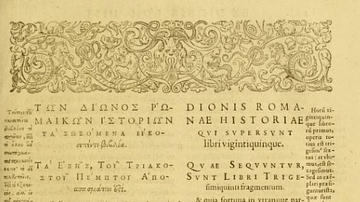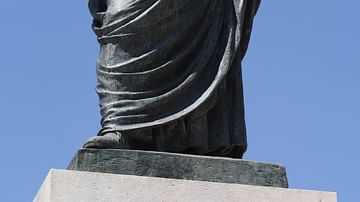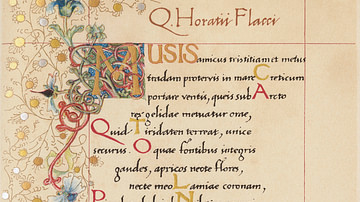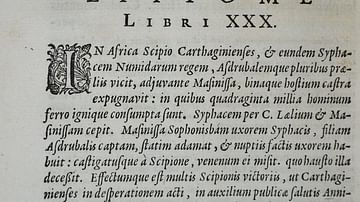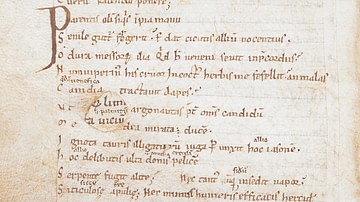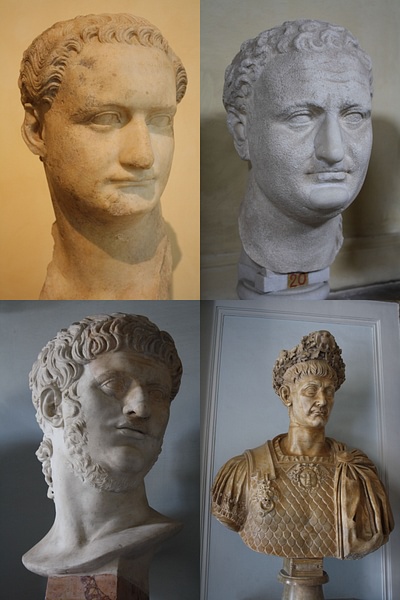
Gaius Suetonius Tranquillus (c. 69 – c. 130/140 CE), better known simply as Suetonius, was a Roman writer whose most famous work is his biographies of the first 12 Caesars. With a position close to the imperial court he was able to access otherwise private sources for his work, and he certainly did not hold back on revealing the sometimes sordid details of Rome's most famously debauched emperors.
Suetonius' Life
Although a biographer of others, Suetonius tells his readers very few details of his own life. The exact date of birth of Suetonius is not known for certain but the most agreed upon range is between 69 and 75 CE. Also uncertain are his place of birth (perhaps either Umbria or Hippo Regius in Numidia) and the year of his death. Suetonius' grandfather was possibly a member of Caligula's court and the writer's father, Suetonius Laetus, was a knight, that is, a member of the equestrian class, holding the position of tribune of the 13th legion during the 69 CE civil war, a legion he commanded at the Battle of Bedriacum in northern Italy.
Some biographical details can be found in the letters of that other famous Roman writer Pliny the Younger, the two being good friends. Suetonius, we are told, was a quiet man who first studied and practised law before becoming a professional scholar. Pliny compliments Suetonius on his writing and poetry - even recommending him to Emperor Trajan - although he chastises him for being slow to finish his work. In c. 110 CE he was offered the position of military tribune in Britain but declined for unknown reasons. Of his later life we know that Suetonius was director of the imperial libraries and then a private secretary to Hadrian, although he was dismissed from this position, again for unknown reasons, perhaps after a lack of protocol and good manners to Empress Sabina. Significantly, this role allowed Suetonius not only to travel with Hadrian to Gaul, Germania, and Britain in 121-122 CE but also to access the state archives and the private letters of previous emperors such as Augustus.
The Twelve Caesars
Suetonius' most famous work is his collection of biographies of Julius Caesar and the first 11 Roman emperors, known simply as The Twelve Caesars (Caesares or De vita Caesarum). The biographies are not wholly flattering nor are events told in chronological sequence but they reveal some candid details of Rome's first citizens. The subjects are:
- Julius Caesar (first few chapters now lost)
- Augustus
- Tiberius
- Caligula
- Claudius
- Nero
- Galba
- Otho
- Vitellius
- Vespasian
- Titus
- Domitian
The general format for each subject is to discuss the person's ancestry and then early life with a view to describing episodes which reveal the character of the future emperor. Then various aspects of the person's public life are described such as wars waged, rivalries, public events they sponsored, and political reforms made with a few anecdotes of private habits thrown in. In this latter category, Suetonius is not averse to revealing the juicy and sometimes shocking details of what the emperors got up to when they were not busy ruling the empire. These gossip details, no doubt, were a major factor in Suetonius' popularity in his own lifetime. A physical description of the subject is usually left until the end.
Although Suetonius takes care to try and use direct quotes and sayings the emperors were known to have used, and he does use written sources whenever possible; he does, at times, present a rather haphazard series of observations, even compared to ancient historians such as Plutarch and Tacitus. Nevertheless, Suetonius was not intending to write a comprehensive history of these great men but rather provide an insight into their strengths and frailties. He also refrains from inserting his own moralising judgments, something both earlier and contemporary writers could not resist doing. In addition, in many instances Suetonius is our only source of information, and so his writings have become as valuable as they are entertaining.
Other Works
Besides this important work Suetonius also wrote many other books which now are either lost or survive only in fragments. He produced another collection of biographies titled On Illustrious Men (De viris illustribus) which described the lives and works of various scholars, poets and rhetoricians, including Virgil, Horace, and Lucan. Two other surviving biographical collections are his On Famous Courtesans and On the Kings, and he also wrote De re publica about the great statesman Cicero.
Suetonius provides valuable historical data in a book titled Roma which covered the various customs, festivals, and even clothing worn in the Roman capital. A similar book of his dealt with Greek games. He also wrote several works on natural history and languages: On Mankind, On Nature, On Keeping Time, On Greek Terms of Abuse, Grammatical Questions, and On Critical Marks in Books.
Below is a selection of extracts from Suetonius' Twelve Caesars:
[On Julius Caesar] …on the day before his murder he had dined at Marcus Lepidus' house, where the topic discussed happened to be 'the best sort of death' – and "Let it come swiftly and unexpectedly", cried Caesar.
[On Augustus] Antony's brother Lucius added that, after sacrificing his virtue to Caesar, Augustus had sold his favours to Aulus Hirtius in Spain, for 3,000 gold pieces, and that he used to soften the hair on his legs by singeing them with red-hot walnut shells.
[On Tiberius] Even as a young officer he was such a hard drinker that his name, Tiberius Claudius Nero, was displaced by the nickname 'Biberius Caldius Mero' – meaning 'Drinker of hot wine with no water added'.
[On Caligula] The method of execution he preferred was to inflict numerous small wounds; and his familiar order: 'Make him feel that he is dying!' soon became proverbial. Once, when the wrong man had been killed, owing to a confusion of names, he announced that the victim had equally deserved death; and often quoted Accius' line: 'Let them hate me so long as they fear me'.
[On Nero] It was strange how amazingly tolerant Nero seemed to be of the insults that everyone cast at him, in the form of jokes and lampoons…in Greek or Latin, posted on city walls or current orally: 'Alcmaeon, Orestes, and Nero are brothers. Why? Because all of them murdered their mothers'.
Vespasian was square-bodied, with strong, well-proportioned limbs, but always wore a strained expression on his face, so that once, when he asked a well-known wit: 'Why not make a joke about me?' the answer came: 'I will, when you have finished relieving yourself'.
[On Domitian] He also claimed that the lot of all Emperors is necessarily wretched, since only their assassination can convince the public that the conspiracies against their lives are real.
